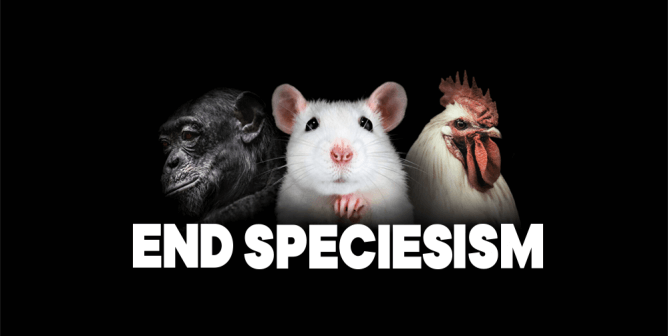Hidden Lives of Rats and Mice
Rats and mice are highly intelligent rodents. They are natural students who excel at learning and understanding concepts. Rats are considerably smaller than dogs, but they are at least as capable of thinking about things and figuring them out as dogs are! And, while rats are much smaller than elephants, they have excellent memories. Although their eyesight is poor, once rats learn a navigation route, they never forget it.
Both mice and rats are also highly social animals. They become attached to each other, love their own families, and easily bond with their human guardians—returning as much affection as is given to them. Many rats will even “groom” a human companion’s hand and would appreciate a massage, a scratch behind the ears, or even a tickle in return. For more fascinating facts and inspiring stories about mice, rats, and other animals, pick up Animalkind, cowritten by PETA founder Ingrid Newkirk.
Recent studies by Jaak Panksepp, a neuroscientist at Bowling Green State University, suggest that when rats play or are playfully tickled, they make chirping sounds that are strikingly similar to human laughter. The rats he studied also bonded socially with the human tickler and even sought to be tickled more. Panksepp corroborates what rat lovers have known all along: “[Y]oung rats have a marvelous sense of fun.”
Male rats will snuggle up for a cuddle and find contentment when they are curled up in a person’s lap. Although female rats are just as affectionate, they tend to be tremendously energetic and inquisitive. Rats love seeing kind people and will often bounce around waiting to be noticed and picked up. Rats can bond with their human companions to the point that if they are suddenly given away to someone else or forgotten, they can pine away—and even die.
Rats and Mice Have Rights!
It is estimated that tens of millions of rats and mice are killed in experiments each year in the U.S. alone. With the popularity of genetic engineering, the numbers are increasing. These small, sensitive creatures are not even protected under the Animal Welfare Act, which exempts birds, rodents, and coldblooded animals entirely from consideration.
Mice and rats are complex, unique, social individuals with the capacity to experience a wide range of emotions. They deserve our respect, compassion, and protection.
The millions of dogs, mice, rabbits, and other animals who are suffering in laboratories need your help today.

Did You Know?
- Mice and rats are fastidiously clean animals, grooming themselves several times a day. In fact, rats and mice are less likely than dogs or cats to catch and transmit parasites and viruses.
- Mice and rats are highly social animals. They communicate with each other using high-frequency sounds that we can’t hear without instrumentation. Mice have even been recorded “singing” like birds but at ultrasonic frequencies. They play together, wrestle, and love sleeping curled up together. Much like us, if they do not have companionship, they can become lonely, anxious, depressed, and stressed.
- Mice and rats have complex systems of communication. They can communicate by touch, by smell, and by sound at frequencies that we can’t hear.
- Rats have clearly demonstrated empathy. In one ethically questionable study, the vast majority of the rats tested chose to help another rat who was being forced to tread water, even when they were offered the opportunity to help themselves to a chocolate treat instead.
- Rats can recognize expressions of pain on other rats’ faces and react to them.
- Mice and rats are so smart that they can recognize their names and respond when called.
- Mice are choosy. They like variety and enjoy picking around in their food—eating the tastiest parts first and separating out what they dislike.
- Female mice with litters will vigorously defend their nests and young.
- If not forced to live in a dirty cage, a rat’s skin has a very pleasant perfume-like scent.
- After engaging in sex, male rats sing at frequencies beyond the range of human hearing, at around 20 to 22 kHz.
You can help protect mice and rats. Take PETA’s pledge to go cruelty-free and purchase only products that are not tested on animals.
As an Amazon Associate, PETA earns from qualifying purchases. If you buy something after clicking the Amazon links on this page, a percentage of the qualifying purchase will be donated to PETA and help us protect more animals from exploitation.





